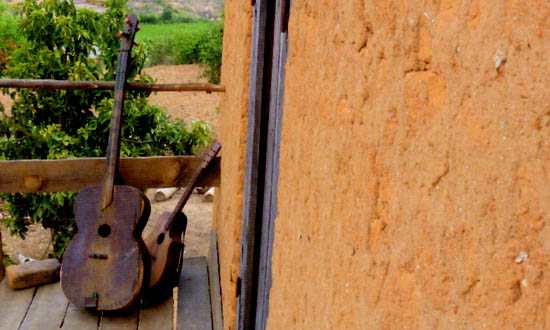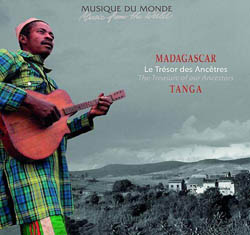|
Madagascar: Le Trésor des Ancêtres
|
|

Tanga
Tanga is a troupe of Betsilio musicians from the southern Madagascar Highlands. Yet, before it was an ensemble, Tanga started out as a single musician by that name, who also farms cassava, rice, sweet potatoes, and other crops. He is also known for his masonry skills, as well as his collection of livestock. As it turns out, Tanga comes from a line of musicians; his grandfather played a gourd-zither, while his father favored the accordion. So, as a child, he took up percussion, bass, and finally, the kabasy, a tenor ukelele-sized lute, which he plays with an intense drive. Once he switched to kabasy, he formed a trio with his brothers, Tanga, which has since swelled to a large collection of singers, musicians, and dancers spanning at least two generations. This is their first album.
Anyone who has heard music from Madagascar, whether it be 78-era Malagasy choral hymns, field recordings of raw fiddlers, accordionists, and other musicians made by the likes of Charles Brooks, professional LPs of valiha masters such as Rakotozafy, or even slick pop such as Tafara, will notice how upbeat this stuff generally is. Also, as demonstrated on Yazoo's fantastic Music of Madagascar CD, the vocals sound nearly Polynesian. Compare the vocal style on this disc to field recordings from Fiji or any neighboring islands and hear for yourself. There is also an organic connection between Tanga's emphatic guitar thrashing, as well as the band's melodic sense, with the banjo and percussion bands found throughout rural Malawi, which is separated from the island by thousands of miles, not to mention a huge chunk of the Indian Ocean. Yet, the similarities are there. But one needs to know none of this to recognize the fact that this band explodes with energy. The tunes are driven by Tanga's kabasy and harmonica, with a foundation staked by a larger, bass-lute and percussion. Over this, the singers make observations about complications from divorce, parents' roles as authority, and the virtues of their village. Between tracks are the sounds of their lives: rice cooking, fields being ploughed with the help of zebus, night frogs, crickets, bush fire, and village conversations.
Tanga has used their music to reach out to local populations throughout the Isandra Valley; they encourage smart cultivation, nutrition, and community protection from thieves. The members straddle life between the rural traditions and the future; the ranks consist of teachers as well as students. So, while these are agrarian, rural people, there is an awareness brought on by education. This disc then, is a fine example of a musical style that's not quite traditional, but draws straight from it and marries it to an awareness of the need for preservation as well as progress. - Bruce Miller
© 2016 RootsWorld. No reproduction of any part of this page or its associated files is permitted without express written permission.
|

|
|
|